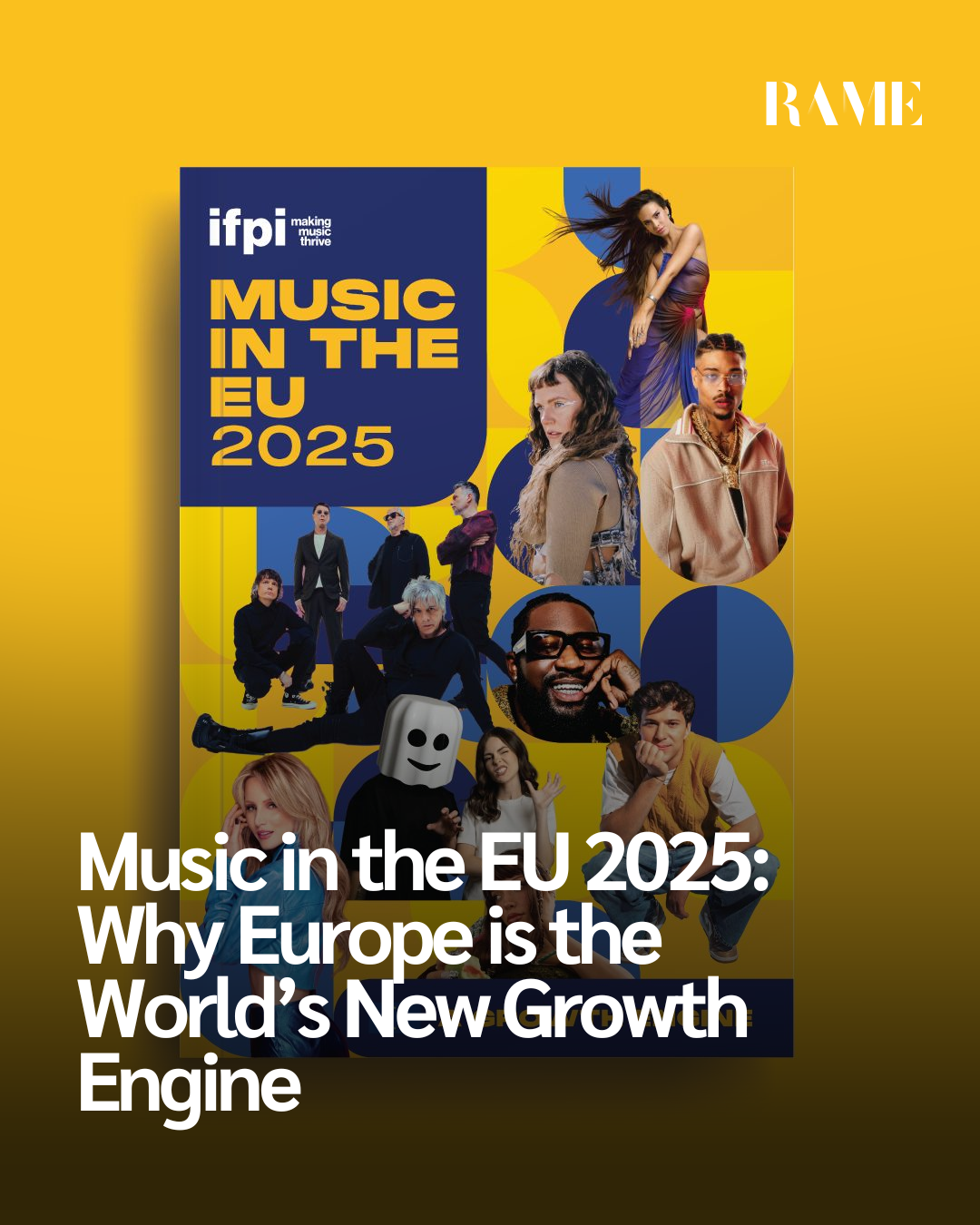Europe’s Rising Beat
For decades, the United States has dominated global music headlines. But in 2025, the story is shifting. A new report, Music in the EU 2025 by IFPI, highlights the European Union not just as a hub of creativity but as the fastest-growing region in recorded music. With revenues soaring, artists breaking international barriers, and policies shaping the future of AI and copyright, Europe is asserting itself as music’s next growth engine.
The Numbers That Tell the Story
In 2024, the EU generated €5.7 billion in recorded music revenues, accounting for 20.7% of the global total. Growth stood at +9.1%, outpacing the United States and surpassing combined revenue increases from the US, China, and BrazilMITE_2025. Streaming is the primary driver: 77.4% of the EU’s growth came from paid subscription platforms, boosted by recent price hikes from Spotify, Deezer, and YouTube Music. But what makes Europe stand out is its diversity nearly 51% of year-end top 10 tracks in EU countries were by domestic artists, compared with 47% worldwide
As Victoria Oakley, CEO of IFPI, puts it:
“Europe is a powerhouse of musical creativity and cultural diversity. With the right policies, we can secure a thriving future for music in Europe.”
Case Studies: Local Roots, Global Reach
Poland: From Local Stage to Global Playlists
Universal Music Group’s Maciej Kutak calls Poland “a hugely exciting moment” for music. With 22.3% growth in 2024, Poland has become a central driver in Central and Eastern Europe. Rising stars like Sara James the first Polish artist featured on Spotify’s global New Music Friday playlist and collaborations with Czech artist Ben Cristovao show how local talent is scaling globally.
Maciej Kutak, CEO of Universal Music Poland, highlights the transformation:
“Poland is leading a wider cultural and commercial shift happening across the region. We’re here to support artists at every stage – to help them achieve local and global impact on their own terms.”
Nordics: Language No Longer a Barrier
The Nordic trio KAJ shook up Eurovision 2025 with a Swedish-language comedy song about saunas. Their President at Warner Music Nordics, Mark Fry, says the strategy is simple: “Language should be a bridge, not a barrier.” KAJ’s track has surpassed 100 million streams, showing how regional acts can resonate far beyond their borders.
Mark Fry, President of Warner Music Nordics, explains:
“We believe in the power of cultural curiosity. It’s about embracing the uniqueness of each Nordic country while recognising that there’s power in working together as a region.”
Romania: Independent Labels Drive Exports
Romania’s Global Records, led by Olga Juverdeanu, is shaping the country into Eastern Europe’s leading exporter.
“At the end of the day, there’s nothing more important than the music, and the magic that happens when you put artists at the centre.”
Acts like Minelli and Irina Rimes are blending genres and collaborating with global stars from Tiesto to Steve Aoki. Romania saw 29.7% streaming revenue growth in 2024, demonstrating the power of independent labels.
France: Artist-First Models
At Sony Music France, Managing Director Marie-Anne Robert has spearheaded an “artist-forward” strategy,
“Our role is to support the artist’s vision, not to control it. That’s what being a true partner means today.”
signing contestants from film Yoroï to the revival of Star Academy and partnering with Orelsan on projects spanning albums and films. France grew 7.5% in 2024, powered by both physical sales and international recognition for artists like Jain and Nej’.
Sweden: The Export Powerhouse
Sweden continues to punch above its weight, with legends from ABBA to Avicii and modern icons like Zara Larsson. Ludvig Werner of IFPI Sweden credits music education and state support for nurturing talent. Exports brought in 5.4 billion SEK (€470m) in 2023, reinforcing Sweden’s role as a cultural and economic powerhouse.
Ludvig Werner, Managing Director of IFPI Sweden, notes:
“It’s hard to overestimate how important music is to Sweden’s identity and soft power. But success isn’t automatic it must be nurtured.”
Policy and AI: Europe’s Big Test
The EU’s new AI Act is hailed as world-first legislation designed to balance innovation with protecting creators. But artists and industry leaders warn that meaningful enforcement is crucial. The “Stay True to the Act” campaign, backed by prominent European musicians, calls on the European Commission to prevent unchecked use of music by generative AI tools.
“Music is human creativity, not data,” the IFPI notes, stressing that AI must serve artists, not replace them. The stakes are high: piracy, streaming manipulation, and deepfake voice clones could undermine growth if policies aren’t enforced.
What It Means for the Future
Europe’s music industry is more than entertainment it’s becoming an economic driver and cultural export machine. With streaming growth, bold regional talent, and strong policy frameworks, the EU is positioning itself as the heartbeat of global music. The challenge now is to ensure innovation strengthens, rather than undermines, the artists at its core.
Conclusion: A New Global Centre of Gravity
Europe’s music scene in 2025 is not just thriving it’s leading. The EU’s blend of cultural diversity, market strength, and forward-looking policies is reshaping the global music map. For policymakers, industry leaders, and fans alike, the message is clear: the soundtrack of the future may well have a European accent.
Read the full report: The report explores the EU as a growth engine – with new insights and case studies.


